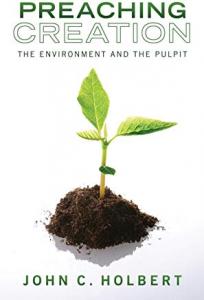 The Bible is replete with excellent sources for preaching and teaching about the dangers of climate change, and I hope you have found some useful ones in my previous five essays on the topic. Today I will conclude my biblical perusal by looking at the New Testament epistles. I hope to show that in these ancient letters there are fabulous insights that a preacher may tap to address the theme with energy and authority. If we believe with the old creedal statement that in the scripture we find “a sufficient rule both of faith and of practice,” then Pauline and post-Pauline letters will serve us well.
The Bible is replete with excellent sources for preaching and teaching about the dangers of climate change, and I hope you have found some useful ones in my previous five essays on the topic. Today I will conclude my biblical perusal by looking at the New Testament epistles. I hope to show that in these ancient letters there are fabulous insights that a preacher may tap to address the theme with energy and authority. If we believe with the old creedal statement that in the scripture we find “a sufficient rule both of faith and of practice,” then Pauline and post-Pauline letters will serve us well.
Let me begin with Paul. The commentary on the great apostle of early Christianity is so vast that no one could ever encompass all of it. And because that is true, there are enormous differences in the ways his words have been understood and appropriated. For the purposes of this essay, I am going to assume two factors: first, among Paul’s earliest letters are the epistle to the Galatians and his final letter was sent to the Roman church, and second, his theological ideas about the impact of the coming of Jesus into the world continued to expand and grow within his written corpus. There is nothing especially controversial about either of these assumptions, but they are crucial for the way I hear Paul address the question of the hour, namely what does Jesus of Nazareth have to do with the full salvation—one might say the rebalancing– of the cosmos of God?
One of Paul’s most quoted phrases is found in Galatians 3:27-29. I quote from the NRSV .
27) As many of you as were baptized into Christ have clothed yourselves with Christ. 28) There is no longer Jew or Greek, there is no longer slave or free, there is no longer male or female; for all of you are one in Christ Jesus. 29) And if you belong to Christ, then you are Abraham’s seed, heirs according to the promise.
This is an astonishingly radical claim. Once you belong to Christ, and your baptism makes that certain, your identity as Jew, Greek, slave, free, male, female no longer has ultimate meaning for you. As Paul puts it somewhat later in 2 Corinthians 5:17, “If anyone is in Christ, there is a new creation; everything old has passed away; look! everything has become new.” In short, in the coming of Jesus, humanity and its hierarchies can never be the same. Translate all of that into the realm of politics, and the implications are volcanic; Roman power is called into serious question, and Christians are called to be subject only to Christ.
However much Paul was able to discern the implications of Jesus’ life for the human community, I would suggest that his searching mind did not stop there. His language began to expand outward into the entire cosmos as the full power of the Jesus experience was revealed to him. In his reflection on the impact of the resurrection of Christ in 1 Cor.15, Paul announces that the final enemy that Jesus defeated was death itself, and that victory was accomplished because finally “all things will be subjected to him, and the son himself will also be subjected to the one who put all things in subjection under him, so that God may be all in all.” Though the sentence is somewhat awkward in its expression, the idea is clear enough that Christ’s role is to bring all things (ta panta in Greek) under his subjection; he is to be Lord of all. The “all” here means far more than merely the human community; all things means exactly what it says—the entire cosmos.
And finally in his letter to Rome, Paul muses more deeply on the role of Christ in all things. Hear these famous words from Rom.8:
18) I think that the sufferings of this time are not worth comparing to the glory about to be unveiled to us. For the creation waits with eager longing for the unveiling of the children of God…22) We know that the whole creation has been groaning in labor pain until now; 23) and not only the creation, but we ourselves, who have the first fruits of the Spirit, groan inwardly as we wait for adoption, the redemption of our bodies.
There is some dispute (and with the study of Paul there is always some dispute!) about the meaning of the word “creation” (ktisis in Greek) in the passage; it may indeed be referring to the whole of non-human creation. If so, Paul here unites the redemption of all creation under the umbrella of Christ’s redemptive work. The entire creation waits and groans, in the same way that we humans wait and groan, for the adoption of God in Christ. In short, Christ’s work is not only for us; it is for the entire cosmos. And if that be true, then we must preach and teach not only about human salvation—it is not just about us—but also and necessarily about the entire creation, the plants, the animals, the soil, the water, all of it. Not only must we celebrate with Paul this amazing work of Christ for the cosmos; we are commanded to join Christ in that work by loving and caring for what Christ has redeemed.
This broad concern for the cosmos continues in the astounding post-Pauline letter to the church at Colossae. I suggest that the author of the Colossian letter summarizes and fixes forever the Pauline notion that Christ has come for all things, not simply humanity. Christians, particularly those concerned with the environment, would do well to commit to memory the beautiful lines found at Col.1:15-20. No fewer than 7 times in these 6 verses, the writer uses one form or another of Greek “all” (pan). The work of Christ is here seen as truly all-encompassing. Just as God in the Hebrew Bible is seen both as creator and ongoing sustainer of the universe, so here in Colossians Jesus is pictured in precisely the same way.
Also, as I spoke of in last week’s essay about the preexistent Woman Wisdom, so now Christ is here similarly depicted. Here he exists prior to the creation of the universe, is supreme over it, and is literally master of all things. How far we have travelled in the New Testament letters from Paul’s conviction in Galatians that Jesus came to alter all human hierarchies. Now in Colossians his coming means a complete redemption, a recombining, a making whole once again, of the entire cosmos. One need not believe in all this high-flown talk literally, need to embrace the historical truth that Jesus was actually existent before the universe’s creation. What the passage does say in superb poetry is that an embrace of God and Jesus is an embrace of all that they have created, all that they sustain. If I say I love Jesus, and do not love the cosmos he has come to redeem, then, to paraphrase the first letter of John, I am a liar. In the face of climate disaster, of the potential extinction of a million species of animals and countless species of plants, as the oceans rise along with the temperatures, as millions of our fellow humans are forced to migrate off their ancestral lands now become uninhabitable, to refuse to love the planet is to reject the love of God in Jesus, no matter how loudly we claim to do so. The time to preach and teach about this now central question is now. I urge you, I beg you, to turn your attention to the collapsing planet and the fast-altering climate that is bringing horrors we all must squarely face lest we, too, become only historical memories, once alive on a planet moving toward catastrophe. Perhaps we might borrow that old, now repudiated demand from the street preacher: “Are you saved, sister?” Well, we are “saved”, made whole, by the power of God in Christ, but that work includes the cosmos, and because that is so, when we ask after salvation, we necessarily ask after the entire universe and all its inhabitants. If we do not, we simply do not know what salvation in fact means.
(Images from Wikimedia Commons)















